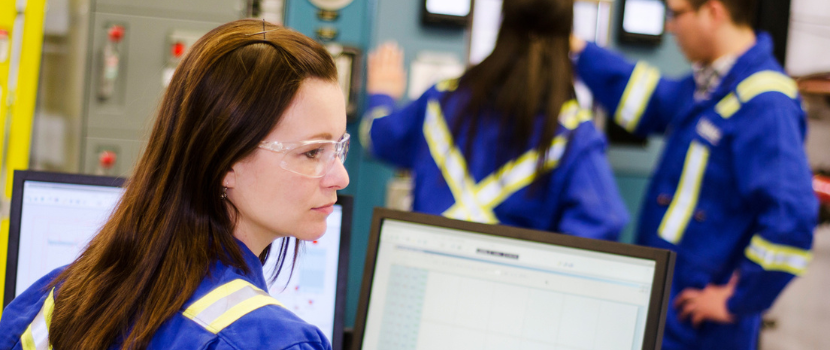
Power engineering technicians help keep power plants running safely and efficiently. A shortage of certified technicians means job opportunities have never been better. You could work in the oil patch, mining, manufacturing, energy, health and other industries. It’s a physical job that requires manual dexterity and good vision, as well as problem-solving skills and a knack for working with machinery.
Length
34 weeks
Location(s)
Delivery is subject to needs assessment.Saskatchewan Polytechnic is Saskatchewan’s primary provider of power engineering certification. We offer two levels of training: the one-year Power Engineering Technician certificate program and the two-year Power Engineering Technology diploma program.
The one-year Power Engineering Technician certificate program is offered at Great Plains College (Swift Current), Southeast College (Estevan) and Suncrest College (Yorkton). You’ll study Fourth Class interprovincial standardized material, which will prepare you to challenge interprovincial Fourth Class examinations.
You’ll receive practical training in boiler operations, maintenance techniques and tool use. You’ll develop troubleshooting skills in practical labs, get boiler firing time in the power lab and industry work experience in your second term.
The balance of hands-on labs, work experience and exam preparation makes Saskatchewan Polytechnic graduates productive on the job from day one—something employers look for when hiring and promoting.
Certification opportunities
As a Power Engineering Technician graduate, you will earn one year of Fourth Class qualifying time credit from the Technical Safety Authority of Saskatchewan (TSASK), and be prepared to challenge:
- TSASK Fourth Class exams, and
- TSASK Refrigeration Engineers exam
Personal study is recommended before you write any industry certification exam.
The Technical Standards and Safety Authority (TSSA) of Ontario website includes a video that provides information about the power engineering industry and training that may be helpful in determining whether this career is right for you. (The program and students shown are not from Saskatchewan Polytechnic).
Provincial certification (TSASK) is required to work in the industry. TSASK test writing fees are not included in tuition.
TSASK examination fees are:
- Fourth Class - Two exams at $108 per exam
- Refrigeration Engineers - One exam at $108
Career and salary information
Your career
Graduates are prepared to work as power engineers or process operators in a variety of industrial and heating plants. These include utility (power) plants, refineries, hospitals, pulp and paper mills, breweries, mines, gas processing plants, heavy oil upgraders, fertilizer plants or chemical plants.
Admissions
Admission requirements
- Grade 12 with Foundations of Math 30 or Pre-Calculus 30*
- Minimum overall average of 65%
- English Language Requirement
Note
- Chemistry and Physics are not admission requirements; however, they would be extremely helpful to your success in the program and may be required by some employers as a condition of employment.
- Accepted applicants are required to provide evidence of a current 2015 WHMIS Globally Harmonized System (GHS) certification within the first month of the program start date. Recertification will be required every three years to remain current. The cost of WHMIS certification is your responsibility.
*Previous Saskatchewan mathematics requirement also accepted:
- Math B30
Alternative admission
Applicants who do not possess the academic qualifications for a program may be admitted if evidence of probable success can be established through an alternative admission assessment. Applicants are automatically considered for alternative admission. However, some specific admission requirements may still need to be met.
ACCUPLACER©
Refer to the ACCUPLACER© cut scores for this program below, and review additional details concerning Alternative Admission using Accuplacer.
- 250 Arithmetic
- 254 Quantitative Reasoning, Algebra, and Statistics
- 250 Reading
- 245 Writing
Post-secondary
Some programs allow applicants to meet the admission grade level requirement using 15 approved post-secondary credits. Review additional information.
Admission method
First Qualified/First Admitted
The First Qualified/First Admitted (FQFA) process is used for the majority of Saskatchewan Polytechnic programs. When we determine that you meet the program's admission requirements, you will be offered admission based on the date you fully qualify for the program. The earlier you provide the appropriate documents and information that qualify you for admission to the next intake, the earlier you might begin your studies.
Applications for all FQFA programs open September 1 each year.
Sponsored programs or programs targeted to specific groups do not accept applications year round or maintain an application pool.
See Admission Processes for more information about this method of admission.
Tuition and fees
Estimates are based on current rates and are subject to change. Amounts for a program may vary by campus. Totals shown here include all mandatory fees as well as approximate cost for books and supplies. Visit the Tuition and Fees web page for a complete breakdown of tuition and fees for this program.
Courses
Get credit for what you know
Prior Learning Assessment and Recognition
Saskatchewan Polytechnic recognizes that adults learn in many different ways. This includes acquiring knowledge and skills through life and work experience or non-formal training.
See link(s) below to get more information about PLAR.
Transfer credit
Many Sask Polytech students benefit from transferring course credit. You may be eligible to transfer credit to Sask Polytech or to another college or university.
Related programs
Instrumentation Engineering Technology
Mechanical Engineering Technology

